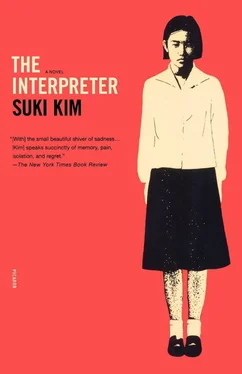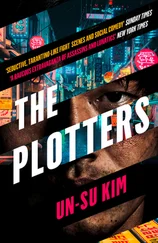“Although I believe that the respondent is not even entitled to a hearing, upon the request of the respondent’s counsel, I am willing to hear her side before making a decision. You may begin, Counsel.”
Suzy translates, leaving out the part about her not being entitled to a hearing. Why drain the woman of her last hope?
“When were you born, madam?” Her lawyer wastes no time.
“Nineteen forty-two. January 7.”
Nineteen forty-two. The year her mother was born. The year of the horse. Mom once said that no one wanted a girl born in the year of the horse, because she was fated to die far from home. The stars never lie, she whispered, as though imparting an ancient wisdom. Suzy thought she was making it up.
“So you are fifty-eight years old.”
If her mother had lived, she would have been fifty-eight. Still a good age. Still young. The ripe age for a parent. It is not right for a parent to disappear before.
“Where were you born?”
“Korea.”
“When did you come to the United States?”
“Nineteen seventy-two.”
“Do you speak or read English?”
“Little.”
“What is the highest level of education you completed?”
“Objection!” the INS attorney lashes. “The counsel’s wasting everyone’s time, Your Honor. His attempt to establish her background at this point serves no purpose.”
“Sustained,” Judge Williams rules. Get to the point, he means. This is just a formality, the woman’s as good as gone.
Surprisingly, Mrs. Choi replies anyway. “Graduate school,” she says. “I received an M.A. in music from Ehwa Women’s University.”
Not unusual. Many Korean immigrants are college graduates. It is a country with a nearly 100 percent literacy rate. Koreans pride themselves on education. A man who owns a dry cleaner’s might have once been an architect, or a pedicurist at a local nail salon might be a trained pharmacist. Their Confucian tradition dictates that learning is the basis of self-worth. But it also backfires. The difference between professionals and merchants is sharp. Most of them never get over the shame of being relegated to the working class. Thus a woman who’s been a cashier at a deli for over twenty years will still hold on to her former life as a music scholar.
A momentary silence washes over the courtroom. Nothing about the woman suggests a music degree. The mass of gray hair gathered into a bun at the back of her head. The sallow face in desperate need of Maybelline or Lancôme or whichever product adds color. Then her cracked fingers, caked with dead skin, the nails chipped, which she quietly hides under her sleeves as though she too is surprised at her own revelation.
“Mrs. Choi, what is your status in the United States?”
“I am a permanent resident.”
“Under what circumstances did you come to the United States from Korea?”
“I came on a student visa.”
“Affiliated with any school?”
“Juilliard.”
“And did you study there?”
“No.”
“What happened?”
“My parents went bankrupt and could no longer send me money.
“So what did you do?”
“I got a job as a cashier at a Korean deli. I was planning on saving up and going back to school.”
“And were you able to?”
“Objection! How is her education history relevant to any of this?” The INS attorney looks exasperated. Suzy has seen this before, many times. Lawyers are always acting frantic. They are perpetually frustrated or running out of time. It must be the first lesson they teach at law schools: act like an asshole if the case is not going your way.
“Sustained,” Judge Williams drones. Come on, his murky eyes suggest, do we really have to go through all this?
“Mrs. Choi, are you currently married?”
“Yes.”
“Do you live with your husband?”
“I did.”
“What do you mean?”
“I did until I was arrested.”
“Any children?”
No answer. Suzy pauses as Mrs. Choi clams up. A silent response is the hardest for an interpreter. A pause signals difficulty. Sometimes the witness is confused or does not know the answer. Sometimes it is a ploy to avoid the question. But most times the witness is stuck because the answer is too painful.
“Mrs. Choi, do you have any children?
“Mrs. Choi, according to the record, you have one daughter, is that correct?
“Mrs. Choi, is your daughter’s name Sue Choi?”
Leave her alone, Suzy pleads silently. Can’t you see the sadness on her face?
“Okay, Mrs. Choi, let’s move on to another topic.” The lawyer relents, or puts the daughter on hold for now. “Where were you employed last?”
“Together Market.”
“Where was Together Market located?”
“Between 125th Street and Lenox Avenue.”
“What kind of business was Together Market?”
“A fruit-and-vegetable store.”
“Who owned it?”
“My husband.”
“What was your job or duty?”
“A cashier during daytime, and in the evenings I prepared food for the salad bar and made fruit cups.”
Mom did that too, Suzy recalls. Although Dad never let Suzy, she saw Mom making fruit cups once. Long before they bought the Tremont Avenue shop. It was Grace who took her there. The store was in Manhattan, very far from Queens. It took nearly an hour on the Number 7 train, and at Grand Central, they got out and walked a few blocks. The woman at the cash register had the deepest double folds on her eyelids. Plastic surgery is common among Korean women to make their eyes bigger, like Meg Ryan’s. Except the folds on this woman looked too fake, and her eyes seemed to pop out of their sockets, the skin around them pulled too tightly. The woman languidly pointed to the kitchen in the back, where Mom was squatting on a milk crate facing a cutting board and boxes of cantaloupes. She was carving melons into moon-shaped pieces before putting them into a plastic container, which she would tie with a rubber band. Then the process would begin again. And again. She was like Cinderella, with a mountain of chores, except the mountain was made up of cantaloupes and the midnight ball never took place. Suzy cannot remember what came next. Did Mom finally turn around and see them there? Or is it possible that before Mom could find them Grace pulled Suzy’s arm with a sudden burst of anger and stormed out? How often had Grace gone there? Did she go back to watch Mom from the doorway? Why had Grace brought her there anyway? Suzy couldn’t stand cantaloupes after that. Or Grand Central, for that matter.
For a while now, the questions have been circling around the store called Together Market—when did her husband purchase the store, how many hours per week did she work there, how much was her annual income. Then he finally zeroes in: “Let’s go back to the night you got arrested, that would be December 2, 1997. Can you, in your own words, explain to the court what happened?”
For a second, Suzy notices Mrs. Choi’s fingers clutching the edge of the seat. Then a curt response: “I stabbed a girl.” Suzy hesitates before translating. She tries to think of a softer word for “stab” in English, but there is no such thing. Mrs. Choi did not mean it softly.
The lawyer seems frustrated by her response. He wants descriptions. Details. Whatever it would take to clarify the picture.
“Let me rephrase the question; please tell us the circumstances surrounding the incident in question.”
“She was a customer, and I stabbed her,” Mrs. Choi answers with not much feeling. And definitely no regret.
“I understand. But could you tell us how the situation specifically arose, or what exchange you had with this customer whom you claim to have stabbed?” He is losing patience. He knew that she would not be an easy witness. Legal Aid had warned him. Despite the language barrier, it is not hard to see that the woman has little interest in saving herself.
Читать дальше












